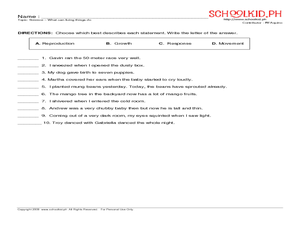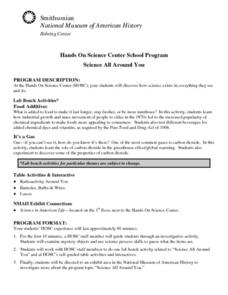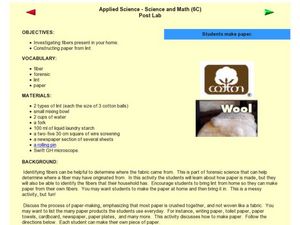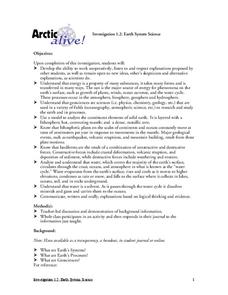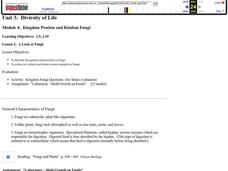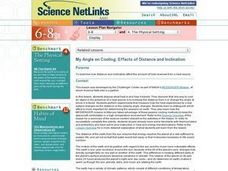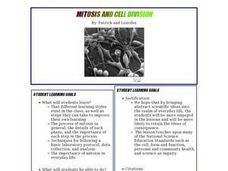Curated OER
Science - What Can Living Things Do
In these living things worksheets, students write true or false for the sentences about living things. Students answer the questions about living things and choose the words that best describe the statements about living things.
Curated OER
Science All Around You
Students visit and explore a Hands On Science Center (HOSC). They participate in a variety of self-guided table exercises and observe as scientists demonstrate various scientific principles.
Curated OER
Exploring Living Science Careers
Young scholars explore a variety of agricultural careers that are available and look into them in terms of the economics and suitability to their interests. In this agriculture careers lesson students research the agriculture...
Curated OER
Pond Life Identification Kit
Young scholars explore ecology and biodiversty. They use the wet-mount procedure to make several slides to view using the microscope and draw what they see.
Curated OER
Life in the Kelp Forest
Young scholars research and create a marine food web to learn about plants and animals in a kelp forest. For this marine food web lesson, students draw lines between kelp forest predators and prey and show the flow of energy in the food...
Curated OER
English Exercises: The Significance of Science in Society
In this significance of science in society worksheet, 8th graders read 3 paragraphs, then interactively answer 9 comprehension and grammar questions, with immediate online feedback; video at the beginning is not longer available, but the...
Curated OER
Applied Science - Science and Math (Post Lab)
Learners explore science. In this create science lesson plan, students come up with their own science experiment. They use their basic knowledge of hypothesis and procedure to come up with an experiment. This lesson plan includes...
Curated OER
Seas Of Life
Young scholars brainstorm examples of predator and prey that are featured in a video they watch. For this investigative lesson students will research an animal from the video and explain if it is a predator or prey and how it helps...
Curated OER
Earth System Science
Students explore the Earth and its ability to support life. They discuss the geosphere and the water cycle and complete the Water Wonders activity. After completing the activity, they respond in their journals and reflect upon the...
Curated OER
Diversity of Life
Students study fungi and its characteristics. In this fungi lesson students collect and observe fungi then answer questions on what they saw.
Curated OER
What's New in Contraception and Reproductive Health?
Students observe life science by completing a class activity. In this sexual health lesson, students identify the newest contraceptive devices and discuss the improvements being made to STD and pregnancy prevention. Students collaborate...
Curated OER
Pulse of Life
Students calculate their pulse rate and explore how heart rate is affected by various activities.
Curated OER
The Dirt on Plants
Students draw and label the four parts of a plant. They describe changes that are part of the common life cycle. Students follow various one and two step directions. They are asked to discuss that they can recall about plants.
Curated OER
Plant Life Cycles - Chapter #2
Call this just a template for a presentation on plant life, not life cycles as the title implies. Content does compare the lengths of different life cycles and describes required conditions for germination, but it also explores cellular...
Curated OER
Squid Dissection
First graders participate in dissecting a squid. They identify and locate specific parts of a squid with teacher guidance. They draw a picture of what their squid looked like and label specific parts.
Curated OER
Leeches: Who Knew?
The answer key to a page of questions about a children's reading on leeches, this resource is missing its companion text. However, the questions could be used with any age appropriate reading about leeches. Readers make predictions,...
Curated OER
Bermuda: Search for Deep Water Caves 2009: Out of Darkness
High schoolers analyze the three models on the origin of troglobitic fauna. In this life science lesson, students also consider how the Zonation model explains the fauna's origin. They also use the Internet to research solutional and...
ARKive
Adaptation: Design a Species
Adapt is what an animal does to ensure it will survive in a specific environment; maybe it's more complicated than that. Your young animal experts can view this handy presentation to better understand animal adaptations and also complete...
Curated OER
My Angle on Cooling: Effects of Distance and Inclination
Middle schoolers discuss what heat is and how it travels. They discover that one way to cool an object in the presence of a heat source is to increase the distance from it or change the angle at which it is faced.
Curated OER
Mitosis and Cell Division
Students discover the processes that occur during mitosis and what makes each phase different and distinct from the others as well as how each contribute to the overall process of mitosis by looking at onion root tips under a microscope.
Curated OER
Very Hungry Caterpillar
Students explore the life cycle of a butterfly. In this life cycle lesson, students read the book the Very Hungry Caterpillar. Students use this book throughout the year to create a year round bulletin board showing the stages of the...
Curated OER
Growing Up
Help little learners understand what happens during the human life cycle. Each slide defines and poses discussion questions regarding each phase of human life. Infancy, childhood, the teen years, adulthood, and old age are all covered....
Curated OER
The Plant Food Factory
Plants need sun and water to survive. Let kids discover these facts by reading a block of informational text and considering a scientific quandary. They read the text, then use the information to complete a two-part question about plant...
Curated OER
Water's Edge Café
Young scholars observe water birds feeding at a local wetland, record what they see, and construct an appropriate menu for a "Waterfowl Cafe." They also play a "flocking" game.
